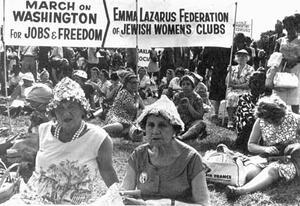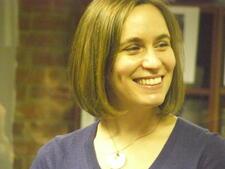A few more stories for the road
The Emma Lazarus Federation was committed to a wide variety of progressive causes, springing from the members' belief in and dedication to their own identification as Jews, as women, as workers and as Americans.
Institution: The Jacob Rader Marcus Center of the American Jewish Archives, Cincinnati, OH, www.americanjewisharchives.org and the New York Herald Tribune; Photograph by Ira Rosenberg.
As I prepare to leave my position as JWA’s Director of Public History after more than 12 years here, my mind keeps returning me back to the summer day in 2000 when I first stepped into the offices of the Jewish Women’s Archive. At the time, I was a disgruntled graduate student, disillusioned with life in the Ivory Tower and the academic study of women’s history. (Was a library really the best place to learn about women’s activism, I wondered?).
That first summer as a research fellow at JWA reignited my passion for history, as I investigated women’s activism by interviewing 12 extraordinary Jewish women who had been honored at JWA’s first “Women Who Dared” event. I reveled in their stories about taking risks and making change on issues as diverse as civil rights, nuclear disarmament, Israel-Palestine, prisoners’ rights, domestic violence, and HIV/AIDS; I probed them about their identities as women and as Jews; I embraced the challenge of telling their stories in an exhibit on the JWA website. By the end of the summer, I knew I had found an intellectual home, where serious conversation and lunchtime laughter enlivened the otherwise cave-like basement offices.
In the course of my daily work creating online exhibits and educational materials, professional development workshops and blog posts, I’ve had the privilege of encountering generations of American Jewish women through their rich stories.
These stories not only inform my practice as a historian, but also my own approach to the world. Photos like this one, of the Emma Lazarus Federation of Women’s Clubs taken at the March on Washington in August 1963 (or as I think of it, “Bubbe goes to Washington”), remind me always to challenge my preconceptions of what an activist looks like or who is “political.” Similarly, the ad for the “Yom Kipur” picnic organized by Emma Goldman and her fellow radicals in 1907 provokes me to consider the boundaries of Jewish practice and the creative secular expressions of Jewish life in America.

Emma Goldman's non-traditional relationship to Jewish practice is evidenced by her participation in events such as this, scheduled on Jewish holy days.
Freethinkers and Radicals
Will Meet at the "Yom Kipur" Picnic
Arranged by the Progressive Library of New York
Wednesday, September 18th, 1907
At Liberty Park
Tickets, 25 cts. Tickets can be secured through the office of Mother Earth
Perhaps my all-time favorite JWA project was the online exhibit, “Jewish Women and the Feminist Revolution,” which gave me new insight into Jewish feminists through words and artifacts contributed by 75 activists. Marcia Falk, known for her bold and beautiful renderings of Hebrew blessings in re-gendered language, told JWA about the first time she shared her own blessings in public:
The next night, in a darkened hall lit only by the multi-wicked candle of the havdalah ritual, I recited four new blessings, in Hebrew and in English, before a community of 300 Jews of almost every religious persuasion, from atheist to modern Orthodox. I recited these blessings as though they had been written a couple of millennia ago by the rabbis, rather than the day before, by me. I offered no apology or explanation (I didn't dare to), and, to my puzzlement and disbelief, the community said Amen.
I’ve returned to her words again and again for their powerful illustration of the creativity of American Judaism, and the essential role an affirming community plays in making that creativity possible.
At JWA, we often talk about role models—how we can expand the range available to us, and what we can learn from them. Sometimes, the most powerful lessons may not be the most obvious ones. I think about this often when I teach Henrietta Szold’s 1916 letter, in which she explains her determination to say kaddish for her mother, despite the unorthodoxy of this practice. Szold is known for her bold Zionist leadership as the founder of Hadassah, but her letter reveals a different side: resolute, yet gentle; strong-minded, yet diplomatic. In this personal letter, I would argue, reside some of her most compelling lessons on leadership.
In an amazing demonstration of Jewish women’s legacy in action, Supreme Court Justice Ruth Bader Ginsburg claims Henrietta Szold and this very letter as one of her central inspirations. In a JWA-sponsored panel at the 2004 Lion of Judah conference at which I was honored to meet Ginsburg, she quoted extensively from Szold’s letter and then reflected, “Szold’s plea for celebration of our common heritage while tolerating, indeed appreciating, the differences among us concerning religious practice is captivating. I recall her words even to this day when a colleague’s position betrays a certain lack of understanding.”
I’m proud, of course, of the ways I’ve contributed to the work of JWA—whether training teachers to use primary sources, developing curriculum on social justice, or documenting the history of Jewish feminism— and I draw inspiration from the many talented Jewish educators who are creatively using JWA resources and shaping the next generation of American Jews. But my time at JWA has been personally as well as professionally meaningful. As the daughter of a feminist pioneer, I’ve been able to contribute to and carry on my mother’s important work in my own way—an opportunity for which I’ve been particularly grateful in the past year since my mother died. I’ve also been able to bring to bear my perspective as a feminist mother of two budding history makers, working every day to ensure that they grow up in a community that values the contributions and experiences of all its members.
Ultimately, my takeaway from these dozen years is less about my impact on JWA than JWA’s impact on me. The stories I’ve been immersed in at JWA have inspired and moved me, and sometimes angered and discouraged me. No matter where my journey takes me next, these stories will continue to shape my sense of who I am and where I come from, and to fuel my commitment to bringing about a more just and compassionate world.









Wishing you all the best in you new endeavors Judith. You've given so much to so many - including a lot to me - and your legacy will stay strong as we all teach to others what you have taught us.
Thanks for everything. Kol Tuv. :) Live - Love - Make Trouble... B'Shalom u vracha, -Jill
So what's next? I'd like to know? Best of luck, Betsy
Thank you, Janie and Beth, for your kind words. It has been a pleasure getting to know you and the other educators I've worked with over the years. It means a lot to me to know the difference JWA has made to you. I hope our paths will continue to cross.
Judith, Thank you so much for all of your work at the JWA. I know how you have touched me personally, and I, in turn, have had the privilege of sparking my students' passions through my Jewish Women's studies classes. My best wishes to you in your new chapter!
Thank you, dear Judith, for your gifts of teaching and sharing. You have empowered, supported, and elevated us as educators and enabled us to share with confidence the stories of Jewish Women who are the foundation of our lives and the inspiration of our future. May you be blessed as you go on your way.